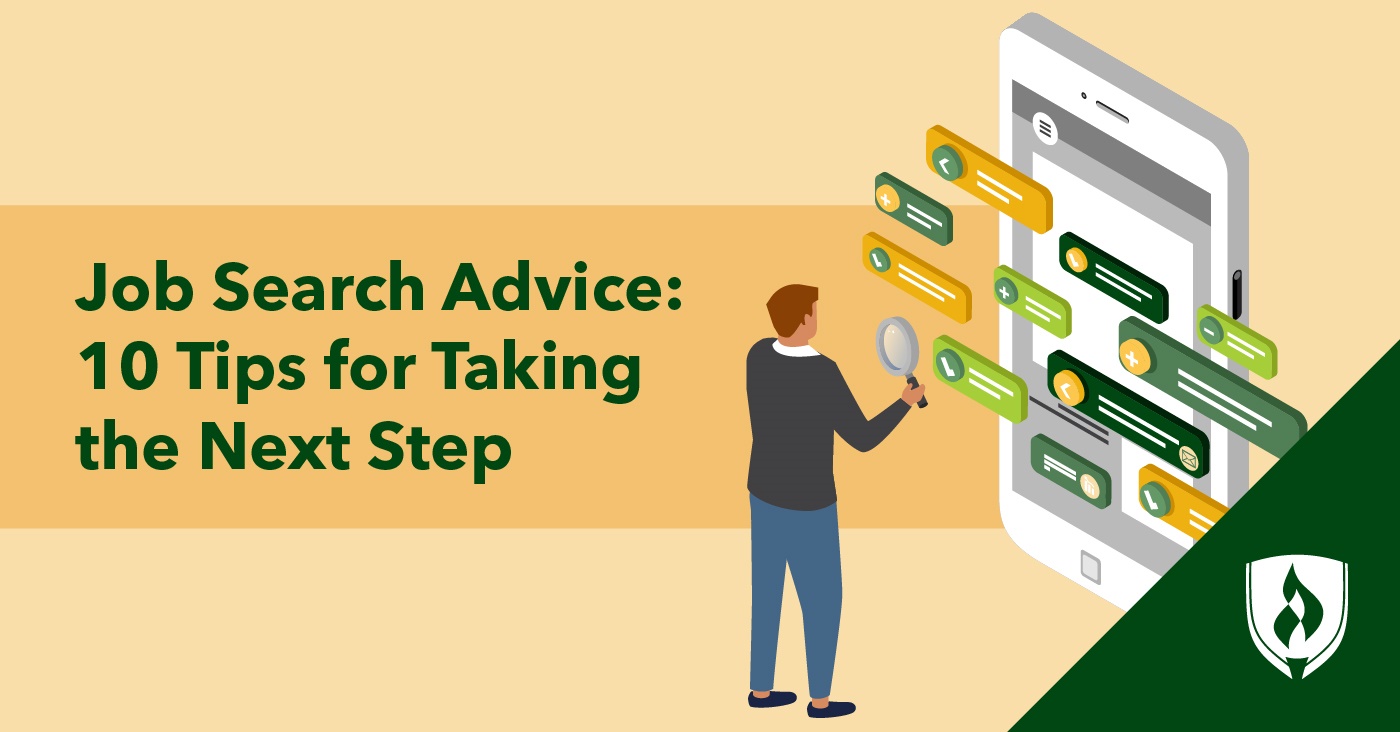
Whether you’re casually looking for a new job or nearing the end of your time in college and planning for what’s next, a job search can be a tough task.
Whether it’s not finding a job that’s interesting or decision overload with too many options, the job search process is full of frustratingly tricky questions. How many jobs should you apply for? What if you don’t meet all the qualifications? Are you looking in the right places?
The uncertainty, second-guessing and rejection that inevitably come with trying to find a new job can be tough to stomach—but that doesn’t mean you’re on your own. We talked to HR and career development pros to gather these 10 pieces of job search advice to level up your hunt.
10 Job search tips to keep in mind
1. Submit quality (not quantity) applications
A common question along the job search is “How many jobs should I apply to?” If you’re wondering whether more is better or if quality should trump quantity, you’re not alone.
“There isn’t a number or range of positions a job seeker should apply to,” says Stephanie Daniels, senior Career Services advisor at Rasmussen University. “What is more important is how the job seeker sees themselves fitting into the roles and how their skills, talents and passions align not only with the position, but also with the company.”
Daniels explains that a poorly thought-out job application will be apparent to the employer. This means your best bet is to focus on quality applications. Even though you are applying to fewer positions, your chances of getting hired will likely increase, as hiring managers will give your application more attention. That being said, don’t get caught in a perfectionist trap and apply to only one or two places—you’ll want to strike a balance.
2. Research the job, company and industry
Scrolling through job postings can be overwhelming, especially with all the different job titles and position types. Which ones fit your degree? Which company fits your life goals? What industries can you work in with your experience?
If you’re unsure where to start, Daniels recommends first doing some research. She says, “Research is a very important piece to a job search to not only know what skills are generally desired of an individual in that role, but also [to] help identify any gaps such as in training, skills, education and more.”
Having a bit of background knowledge in an interview or job hunt will give you confidence, notes Daniels. Not to mention, you are more empowered to make informed decisions when negotiating salary or benefits.
If you’re looking for a place to start investigating, Daniels has a few recommendations: “Websites such as O*Net OnLine, BLS.gov, [and] CareerOneStop have a wealth of information to help you understand what it might take to earn your dream job.” She also recommends doing informational interviews with people in your desired industry. As a bonus, these build your network.
3. Apply to jobs even if you don’t meet all the qualifications
The long list of qualifications on job postings can be quite daunting. Surely nobody can meet all those requirements, right? Maybe you’ve struggled to find a job where you feel confident that you fulfill all the listed skills. But don’t sell yourself short.
Job descriptions are often an employer’s wish list for the perfect employee. As Daniels puts it, “A job description is a general guideline.” She explains that applicants shouldn’t let requirements they don’t quite meet be an obstacle. Additionally, she says that many applicants may even have more skills than they think, as all sorts of experience—not only traditional jobs—can be important.
Indeed, Vanessa Rosenblum-Inglese, president of Pro R.E.A. Staffing, says, “If you meet more than 70 percent of the requirements, apply for the job.” And according to Daniels, the real guide for whether you should apply to a position is if you are genuinely excited about it and can apply the skills you do have to that job.
4. Ask your network for help
“The most common mistake I see job seekers making is not leveraging their support team,” says Daniels. Your support team consists of anybody who will help you grow as a professional. Whether that’s a manager, professor or advisor, getting honest feedback is critical to developing as a professional.
Don’t wait to ask for help, though. “Rather than waiting, connect with Career Services a few months before you start applying,” says Daniels. This way, when you start applying for jobs, you’re already ahead of the game with your resume, cover letter, professional presence and research.
Focus on resume or cover letter reviews, mock interviews and seeking advice. For any area you’re nervous about, see if someone in your network can help you. Rather than muddling through the first few applications, you’ll have a stronger chance of being called in for an interview.
5. Search smart and look beyond job boards
Not only can your network dispense helpful advice, but they can also help you find job opportunities. In fact, some estimates show that 85 percent of jobs are filled through networking connections.1
“When job searching, look for jobs that are not advertised,” says Chris Lewandowski, president of Princess Dental Staffing. “Often, the best jobs are found through networking and word-of-mouth rather than online job postings. Hence, reach out to your professional connections and let them know you are looking for a job. They may have insider knowledge of unadvertised positions or be able to put in a good word for you.”
Beyond LinkedIn® and other job postings sites, keep an eye on job boards for any companies you’d like to work for and watch industry websites, as some will advertise jobs. If a particular company you’d love to work for isn’t currently hiring, you can often sign up for email updates on new postings. Or you can even reach out to the company with your resume and ask if they can let you know when an opening arises.
6. Customize your resume
While it is tempting to save some time and submit the same resume to every job, Daniels says this is another common mistake she sees applicants making. Instead, she recommends customizing your resume for each job description.
She explains that applicant tracking systems—computer systems that are often the first wave of screening applicants—work by looking for keywords specific to the position and can even rank applicants. The result is that resumes that aren’t customized for the particular position, have errors or don’t work well with the computer system may be filtered out.
To avoid getting cut by the computer, look at the job description for key terms that match your skills—or have a list of key industry terms—and include them on your resume. You can also mimic some of the word choices the company uses in the description or on their website. Just make sure you aren’t copy-pasting phrases into your resume, as this will be clunky.
7. Follow the directions
It may seem obvious to follow the application directions, but Daniels says that many applicants don’t. It’s a simple step to double-check before you submit your resume and cover letter, but it can give you a critical leg up.
And while it may seem like a good idea to bend the rules to stand out, in any job, you’ll need to follow instructions, whether that be weekly assignments from your boss or even just getting your work computer set up. Making sure your application includes all the required materials and meets any other specifications shows that you can take direction.
8. Leverage your skills and qualifications
Through the job search, there’s plenty to make you doubt yourself. But you’re probably a better candidate than you think.
“Often, job seekers can sabotage their chance of a callback because they focus too much on the skills they lack,” says Matt Erhard, managing partner at Summit Search Group. “Instead of using the limited space in your cover letter to explain why you don’t have certain skills, devote that space to how your skill sets will add value if you’re hired.”
And, as Daniels noted, any experiences you’ve had—whether paid or unpaid and whether a typical job or not—add to your skill set. You may have more qualifications than you think. And all experience is valuable.
9. Stay professional in all interactions
Once you’ve gone through a few applications, it’s easy to let your professionalism slip into fatigue. However, in all your communications with a company, it’s important to not skimp on the basic courtesies and rules.
“Every interaction you have with the company influences their perception of you as a candidate,” says Erhard. “I have seen many job seekers turn in exceptional applications then sabotage their employment odds by failing to respond to messages, responding unprofessionally or failing to follow the instructions and proper steps of the application process.”
Erhard recommends keeping a constructive and professional tone, following up and replying quickly. Additionally, Rosenblum-Inglese reminds applicants to proofread all their communications. Letting obvious errors slip through can show that you don’t care about details or even don’t care about the job.
10. Create a plan
Balancing all these steps through the job search can be quite tricky. To avoid forgetting something or frantically editing your resume before the job posting closes, create a structured plan for your job hunt.
Be intentional with where you look for jobs by regularly checking job boards and reaching out to network connections. Then, track jobs you’re interested in or you’ve applied to in a spreadsheet and create calendar reminders for deadlines. This way, you’ll never miss an application deadline or forget to follow up.
Additionally, if you generally plan out your job search, you can budget in time for informational interviews, research and customizing your resume. Keeping organized—in whatever ways work for you—will make the application process smoother and reduce the stress load.
Ace the interview
With these job search tips in hand, you’re ready to find the fit for you and move through the job search with minimal stress.
Once you’ve found the perfect job and landed an interview, the next step is to wow your interviewer. Between intentionally tricky questions and varying styles of interviews, there’s a lot that can go wrong for you during this phase if you’re not prepared. Learn what to expect in different types of interviews and boost your interview skills with our article “7 Types of Job Interviews (And How to Ace Them).”
1 Lou Adler, “New Survey Reveals 85% of All Jobs are Filled Via Networking,” LinkedIn, February 26, 2016, June 16, 2022, https://www.linkedin.com/pulse/new-survey-reveals-85-all-jobs-filled-via-networking-lou-adler.
LinkedIn is a registered trademark of LinkedIn, Inc.




